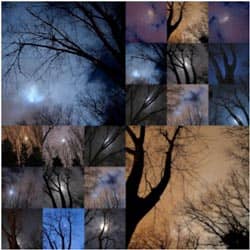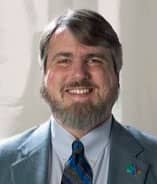By Donald H. Frew
 I am an Elder of the Covenant of the Goddess, the world's largest religious organization for Neo-Pagan Witches, and I currently serve that organization as its National Public Information Officer. I have spent years handling virtually all of CoG's interfaith outreach. And in that capacity, I served on the Board of Directors of the Berkeley Area Interfaith Council.
I am an Elder of the Covenant of the Goddess, the world's largest religious organization for Neo-Pagan Witches, and I currently serve that organization as its National Public Information Officer. I have spent years handling virtually all of CoG's interfaith outreach. And in that capacity, I served on the Board of Directors of the Berkeley Area Interfaith Council.
Dr. J. Gordon Melton has addressed the challenges for "mainstream" religious groups encountering what he called New Religious Movements. He spoke from the point of view of a minister in one of those "mainstream" faiths looking out at all the New Religious Movements all over America. I am here, as a Neo-Pagan priest, to offer some observations from the other side of the dialogue.
First, a little bit of background... Although I was an avid student of the world's mythologies as a child, I began formal study of the world's religions as a Religious Studies major at the University of California at Berkeley. I remember well the very first class, Introduction to Religious Studies, taught by Prof. Mark Jurgensmeyer. Mark talked about the so-called "big five" religions: Christianity, Judaism, Islam, Buddhism, and Hinduism.
But, he said, let's take a closer look at these things all being called by the same name: "religions." The terms "Christianity" and "Buddhism" both refer to an individual who is considered the founder and whose teachings are followed. "Judaism" refers to a people and describes those of a particular ancestry. "Islam" literally means "to submit," and refers to the spiritual attitude of its followers. "Hinduism" rather vaguely refers to "all those religions over there on the other side of the Indus river."
Immediately, we can see that these are five very different things, and in calling them all by the single term "religion" we assume some kind of uniformity of structure between them. Mark assigned a book, The Meaning and End of Religion by Wilfred Cantwell Smith, that explored this further.
Smith argues that, as we have seen, the word "religion" implies a certain conformity of concept. It generates presuppositions about other "religions" that may not be true. As an alternative, he suggests the terms "faith" and "practice" as less loaded with presupposition.
I would encounter these concepts again, years later, when I first approached the Berkeley Area Interfaith Council as the elected representative from Covenant of the Goddess. Although I was greeted very warmly and accepted immediately, I was asked those same questions that, years later now as a BAIC Board member, I still hear some ask of other new "alternative" groups.
"Whom do you worship?" they would ask.
"Well, no one really."
"Well then, to whom do you pray?"
"Well, we don't pray, as such."
"Well, what do you believe?"
"We don't really have beliefs."
"What is your Bible?"
"We don't have one."
"Where are your churches?"
"We don't have any."
"Who is your prophet or leader?"
"We don't have one of those, either."
"How can you achieve salvation, then?"
"We don't even have the concept of salvation."
And so on, and so on... All of which gives the impression that we are either not really a religion (the "pseudo-religion" that the Greek Orthodox host committee was so worried about), or at least a seriously inadequate one.
Half-baked, you might say.
Nothing could be further from the truth.
We live in a society in which information is communicated by the sound bite: the short, pithy, to the point, statement of fact. What makes the Jerry Falwells of the world so popular with the media is their ability to give short, scriptural answers to complex social questions. We here at the Parliament, as serious practitioners of our respective faiths, know that religion and spirituality are much more complex than that; that any spiritual path worth its salt is deeper than can be conveyed in a sound bite.
So it is with the questions asked by the BAIC and others.
Whom do we worship?
To us, the word "worship" implies submission to a higher authority. We do not submit to the Gods; rather we recognize Their greater power and wisdom and invite that power and wisdom to manifest through us in our lives. Our practices seek to make us one with the Divine. We find it in ourselves and each other. Under those circumstances, we honor and venerate the Gods, but few Witches would feel comfortable with a word like "worship."
To whom do we pray?
To most of us, prayer is seen either as a communing with an omnipotent being who will do what he wills regardless of the intent of the prayer or as a beseeching to that being to intercede on one's behalf. In contrast, most Witches achieve the same ends by magick, but magick is seen as an interaction between the Gods and the magician. The magician through the use of natural powers focused by will, may well be able to achieve the desired ends on his or her own (whether that is healing, a job, or whatever), but by opening to the Divine invites the appropriate Gods and/or Goddesses to lend their aid as well, accepting that the desired goal may be opposed by the Gods and the magical work come to naught.





